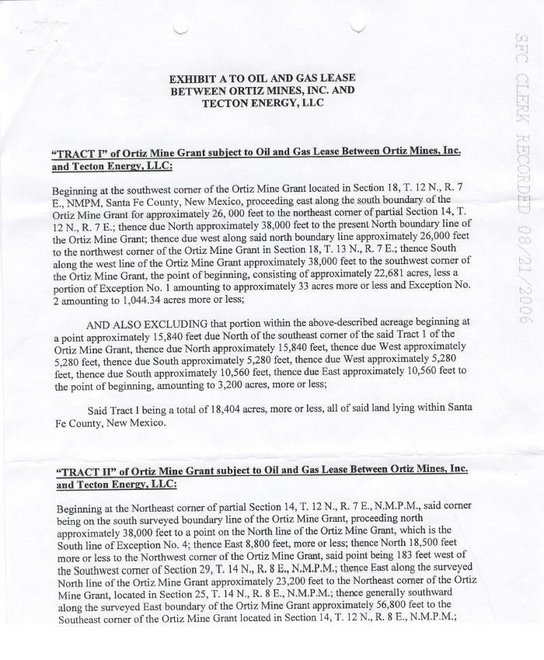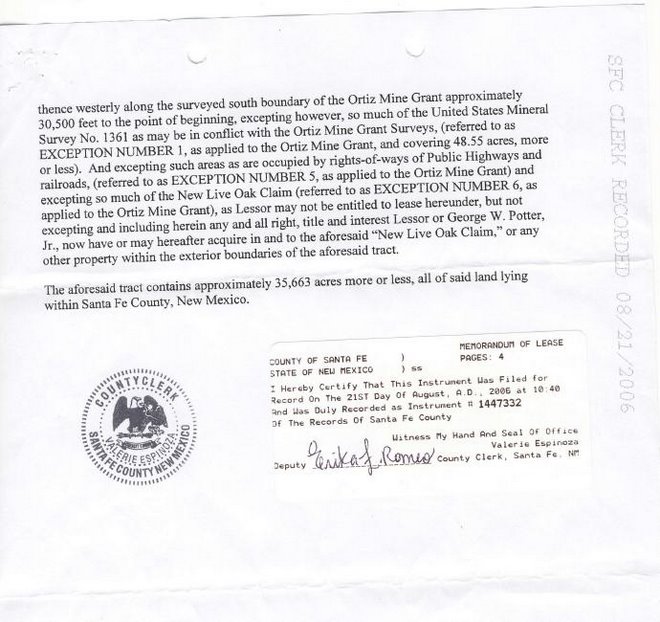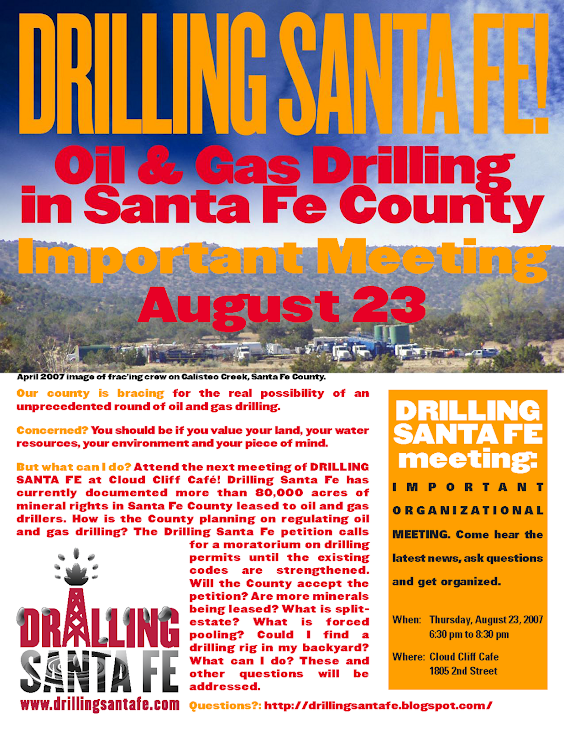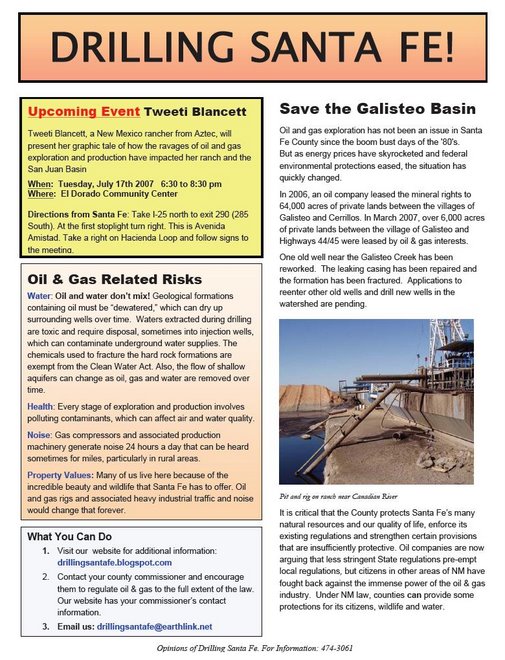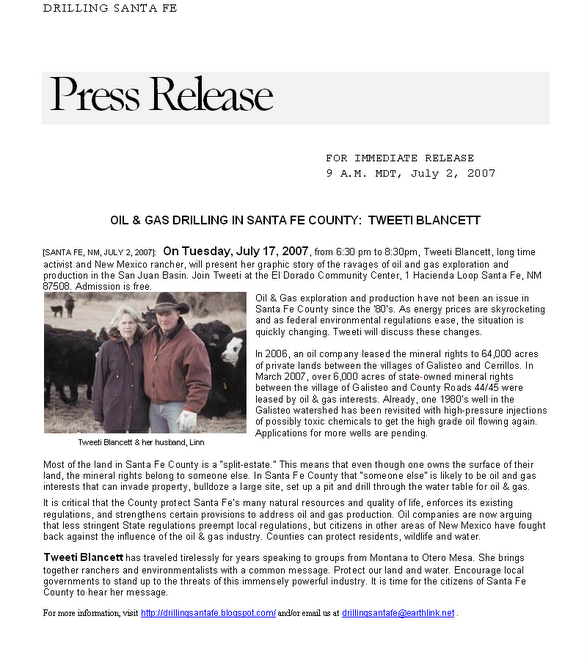Until about the 1st of May, there will be a break in posting.
See you in the Spring!
An Agency's Limits
Articles in this series examine the risks of natural-gas drilling and efforts to regulate this rapidly growing industry.
"A summary of developments in the Legislature's 60-day session, which ended Saturday.
Gov. Susana Martinez has until April 8 to sign or veto bills passed during the final stretch of the session.
ENERGY-ENVIRONMENT(equals)
Passed: Governmental task force to investigate natural gas outages; create energy conservation bonds; tax credit for biofuels produced from algae; expand scope of cost cap for utilities in meeting with renewable energy requirements; update abandoned mine reclamation law to remain eligible for federal funding; Renewable Energy Transmission Authority bonding changes.
Failed: Invalidate state regulations on greenhouse gas emissions; allow severance tax fund investments in New Mexico renewable energy projects; tax credit for converting vehicles to run on natural gas; define ownership rights in underground pore space that can be used for storage of carbon dioxide." More>>>>
"Biggest radioactive spill in U.S. history was in New Mexico (Listen again)
by Nicholas Kusnetz and Marian Wang
ProPublica, March 18, 2011, 4:25 p.m.
"Since this time last year, we’ve seen a deadly mine disaster [1], the worst oil spill in U.S. history [2], and now a nuclear crisis in Japan [3]. That got us wondering—how does one compare or quantify the human cost of different sources of energy?
As it turns out, a Swiss research organization, the Paul Sherrer Institute, has been doing just that. Using data from the institute, we pulled together a few visualizations." More>>>>
"Connecticut and five other states seeking to persuade the Supreme Court to allow greenhouse gas emissions to be regulated via federal common law have suggested the justices should avoid deciding the case and instead send it back to a lower court.
In their final brief filed in American Electric Power v. Connecticut, the states maintain their position that greenhouse gas emissions can be regulated as a "public nuisance" under federal common law.
But they say that the court should wait to see what happens to the ongoing efforts by U.S. EPA to regulate emissions before deciding the issue.
The states point in particular to the recent settlement in which EPA agreed to set new greenhouse gas limits for refineries and power plants (Greenwire, Dec. 23, 2010).
That announcement came several weeks after the Supreme Court decided to hear the case, which is due to be argued April 19." More>>>>
3/13/2011
"HOUSTON -- The United States' North American neighbors are considering importing U.S. natural gas to meet their burgeoning electricity needs.
Mexico's chief energy minister said yesterday that his nation is carefully eyeing the U.S. revolution in shale gas production to help fuel Mexico's fast-growing economy.
Mexico's new development of renewable energy resources and fossil-fuel power is not occurring fast enough to meet the growth, the energy minister, José Antonio Meade, told a major energy industry conference here. The U.S. shale gas boom and the potential for exporting U.S. drilling technologies has been a dominant theme at the gathering (Greenwire, March 10).
"Because of the new technology advances in terms of generating shale gas, now this continent is one of the cheapest in terms of using gas for generating electricity," Mede said. "Mexico, I think, is in a good position to take advantage of that."' More>>>>
"Is “drill, baby, drill” about to make a comeback?
With gas prices soaring, Congressional Republicans are clamoring for more domestic energy production, echoing the theme of an impromptu 2008 protest when Republicans occupied the floor of the House during the summer recess to demand that Congress lift a ban on drilling off of much of the nation’s coastline.
At a press conference on Thursday, Speaker John A. Boehner said Republicans were moving ahead with an umbrella initiative that would seek to spur more domestic energy production and end federal policies he said were contributing to rising gas costs.
“Through the American Energy Initiative, we will work to help lower gas prices, reduce our dependence on foreign oil and create new jobs,” Mr. Boehner said." More>>>>
by Abrahm Lustgarten , Nicholas Kusnetz and Joaquin Sapien
ProPublica, March 9, 2011, 10:50 p.m.
"Pennsylvania has come under fire lately as pollution from drilling in the Marcellus Shale threatens water resources across the state. But instead of ratcheting up oversight, Gov. Tom Corbett wants to hand authority over some of the state’s most critical environmental decisions to C. Alan Walker, a Pennsylvania energy executive with his own track record of running up against the state’s environmental regulations.
Walker, who has contributed $184,000 to Corbett’s campaign efforts since 2004, is CEO and owner of Bradford Energy Company and Bradford Coal, which was once among Pennsylvania’s largest coal mining companies. He also owns or has an interest in 12 other companies, including a trucking business and a central Pennsylvania oil and gas company." More>>>>
"A bill that would bar the New Mexico Environmental Improvement Board from making any greenhouse gas rules that are more stringent than federal law is making its way through Senate committees.
The bill, SB 489, sponsored by Clinton Harden, (R-Clovis), would not reverse the two carbon cap proposals that were approved in the waning days of the Richardson Administration. Those proposals drew strong opposition from the oil and gas industry and from Gov. Susana Martinez, who vowed during her campaign to reverse them if elected governor.
(A few weeks ago, Clearly New Mexico learned that Gov. Martinez had appointed a Small Business-Friendly task force filled with representatives of the oil and gas industry and other large corporate interests to evaluate regulations like the carbon caps. The group made it clear that rolling back regulations was their number one priority, and discussed a number of strategies to accomplish this that included legislation, executive orders, and other tactics.)
Though SB 489 wouldn’t reverse the current caps, it would severely hamper New Mexico’s ability to protect its environment in the future, opponents say.
Friends of the Environment Oppose It" More>>>>
"CHEYENNE, Wyo. -- Wyoming, famous for its crisp mountain air and breathtaking, far-as-the-eye-can-see vistas, is looking a lot like smoggy Los Angeles these days because of a boom in natural gas drilling.
Folks who live near the gas fields in the western part of this outdoorsy state are complaining of watery eyes, shortness of breath and bloody noses because of ozone levels that have exceeded what people in L.A. and other major cities wheeze through on their worst pollution days." More>>>>
Associated Press - March 8, 2011 7:25 PM ET
"SANTA FE, N.M. (AP) - Gov. Susana Martinez has nominated an assistant commissioner at the State Land Office to serve as head of the state Energy, Minerals and Natural Resources Department.
Martinez says John Bemis' experience in overseeing energy development at the Land Office makes him a qualified candidate.
Bemis joined the State Land Office in 2003 and has served as assistant commissioner for oil, gas, and mineral resources since 2004. He previously worked as senior attorney for the Farmington region at Burlington Resources, Inc." More>>>>
Email from Jerry
"A substitute bill for SB 421 was tabled by the Senate Judiciary Committee at about 9:50 pm last evening. Many thanks to all who helped make that happen."
See:
"Hello friends
I wish there were an easier more predictable way for use to make ourselves heard, but here’s the update:
HB 422 and SB 421, the twin bill s that would allow mineral rights owners absolute veto over State historic listing of any property or district, did NOT get heard last week.
If you haven’t contacted legislators to oppose these, there is still time, especially for SB 421. See earlier e-mails for phone numbers.
If there’s any chance of attending a hearing, here is the most current info:
HB 422 is one of 4 bills up in front of House Energy & Natural Resources, (Egolf’s committee). They will meet Monday the 7th at 8:30 am, different room than usual: room 309.
The good news is that with the early schedule, they can be counted on to meet when they say.
SB 421 will be in front of the Senate Judiciary Committee. They meet in Room 321, “at 2:30 or half an hour after the main Senate floor session ends”. It is one of 14 bills on their agenda.
I spent Friday from 2:30 till 6:00 when the committee actually convened, and then found they’d dropped 421 from the day’s agenda. It’s frustrating, but if you can spare the time, our voices are needed.
You may have seen the New Mexican editorial about how Bratton’s Brats (the HENRC GOP) maneuvered HB 297 (weakening the Oil Conservation Division) past HENRC using technicalities, contrived absences, and quorum manipulation. Read the editorial, then call or e-mail to express your disapproval and ask Reps to oppose it on the floor of the House.
We’re all getting tired, but only 13 more days to go. Do whatever you can, please.
Kim"
Carol M. Browner, left, the E.P.A. administrator in the Clinton administration, has argued both for and against exemptions for the oil and gas industry.
Drilling Down
An Agency's Limits
Articles in this series examine the risks of natural-gas drilling and efforts to regulate this rapidly growing industry.
In its efforts to oppose new federal regulations, the oil and gas industry found allies in Senator James M. Inhofe, left, and Senator Tom Coburn, Republicans from Oklahoma.
But that is not what Congress heard. Some of the recommendations concerning oil and gas waste were eliminated in the final report handed to lawmakers in 1987.
“It was like the science didn’t matter,” Carla Greathouse, the author of the study, said in a recent interview. “The industry was going to get what it wanted, and we were not supposed to stand in the way.”
E.P.A. officials told her, she said, that her findings were altered because of pressure from the Office of Legal Counsel of the White House under Ronald Reagan. A spokesman for the E.P.A. declined to comment.
Ms. Greathouse’s experience was not an isolated case. More than a quarter-century of efforts by some lawmakers and regulators to force the federal government to police the industry better have been thwarted, as E.P.A. studies have been repeatedly narrowed in scope and important findings have been removed.
For example, the agency had planned to call last year for a moratorium on the gas-drilling technique known as hydrofracking in the New York City watershed, according to internal documents, but the advice was removed from the publicly released letter sent to New York.
Now some scientists and lawyers at the E.P.A. are wondering whether history is about to repeat itself as the agency undertakes a broad new study of natural gas drilling and its potential risks, with preliminary results scheduled to be delivered next year.
The documents show that the agency dropped some plans to model radioactivity in drilling wastewater being discharged by treatment plants into rivers upstream from drinking water intake plants. And in Congress, members from drilling states like Oklahoma have pressured the agency to keep the focus of the new study narrow.
They have been helped in their lobbying efforts by a compelling storyline: Cutting red tape helps these energy companies reduce the nation’s dependence on other countries for fuel. Natural gas is also a cleaner-burning alternative to coal and plentiful within United States borders, so it can create jobs.
But interviews with E.P.A. scientists, and confidential documents obtained by The New York Times, show long and deep divisions within the agency over whether and how to increase regulation of oil and gas drillers, and over the enforcement of existing laws that some agency officials say are clearly being violated.
Agency lawyers are heatedly debating whether to intervene in Pennsylvania, where drilling for gas has increased sharply, to stop what some of those lawyers say is a clear violation of federal pollution laws: drilling waste discharged into rivers and streams with minimal treatment. The outcome of that dispute has the potential to halt the breakneck growth of drilling in Pennsylvania.
The E.P.A. has taken strong stands in some places, like Texas, where in December it overrode state regulators and intervened after a local driller was suspected of water contamination. Elsewhere, the agency has pulled its punches, as in New York.
Asked why the letter about hydrofracking in the New York City watershed had been revised, an agency scientist involved in writing it offered a one-word explanation: “politics.”
Natural gas drilling companies have major exemptions from parts of at least 7 of the 15 sweeping federal environmental laws that regulate most other heavy industries and were written to protect air and drinking water from radioactive and hazardous chemicals.
Coal mine operators that want to inject toxic wastewater into the ground must get permission from the federal authorities. But when natural gas companies want to inject chemical-laced water and sand into the ground during hydrofracking, they do not have to follow the same rules.
The air pollution from a sprawling steel plant with multiple buildings is added together when regulators decide whether certain strict rules will apply. At a natural gas site, the toxic fumes from various parts of it — a compressor station and a storage tank, for example — are counted separately rather than cumulatively, so many overall gas well operations are subject to looser caps on their emissions.
An Earlier Reversal
The E.P.A. also studied hydrofracking in 2004, when Congress considered whether the process should be fully regulated by the Safe Drinking Water Act.
An early draft of the study discussed potentially dangerous levels of contamination in hydrofracking fluids and mentioned “possible evidence” of contamination of an aquifer. The report’s final version excluded these points, concluding instead that hydrofracking “poses little or no threat to drinking water.”
Shortly after the study was released, an E.P.A. whistle-blower said the agency had been strongly influenced by industry and political pressure. Agency leaders at the time stood by the study’s findings.
"Put on the defensive by a new report claiming that U.S. EPA scaled back its study of the potential health threats of natural gas drilling in response to pressure from industry, Administrator Lisa Jackson insisted today on Capitol Hill that she won't let politics trump science.
A series published this week in The New York Times has investigated federal regulation of hydraulic fracturing, a technique that has opened up massive reserves of natural gas across the country. EPA is planning to launch a two-year study on the environmental and health impacts of the process, but some areas of study that were suggested by agency scientists were stripped from the final research plan because of pressure from the oil and gas industry, according to an article published today (Greenwire, March 3).
Tomorrow, Jackson is headed to Pennsylvania, one of several states that sit on top of the vast, gas-filled rock formation known as the Marcellus Shale, she told members of the House Appropriations Committee during a hearing on the agency's budget today.
She described the meeting with federal officials at EPA's regional office in Philadelphia as an effort to understand the "state of play" at the Region 3 headquarters, which has been at the center of the controversy. Despite what several agency attorneys and scientists told the Times, the agency is committed to sound science, Jackson said.
"I need to speak to the professionals out in the Philly office and ensure that they hear from the top of this organization that there is no 'Look the other way, stand down,'" she said. "We intend to do our jobs."' More>>>>
"The small town of Dish, which has previously sparred with natural gas drillers over its water quality, also thinks natural gas compressor stations are an unsightly and perhaps dangerous nuisance that harm local property values.
The town makes those complaints in a lawsuit filed Monday in District Court in Denton County against six natural gas pipeline companies.
The suit calls a complex of compressor stations that the companies operate near the town "a public nuisance." It also alleges that the compressor stations have harmed the emotional and financial well-being of the community, which is southwest of Denton.
Fort Worth lawyer Kirk Claunch, who is representing the town, filed the lawsuit and two others on behalf of 10 landowners. The suits claim that landowners and the town are entitled to collect monetary damages from the gas companies because of diminished property values.
The mere presence of the compressor stations, the truck traffic they generate and the potentially dangerous air pollutants constitute trespass on Dish residents' property and "makes it less desirable to live in that area," Claunch said Wednesday. Compressor stations typically employ huge engines to drive pumps to move natural gas through the big pipelines.
"The reality of it is, if people that live close to these facilities want to leave, they can't because of the decline in property values," Claunch said.
Ed Ireland, executive director of the Barnett Shale Energy Education Council, an industry supported group, said he had not seen the suits and declined to comment on the specific allegations." More>>>>
"During the Revolutionary War Philadelphia served as one of America’s first capital cities. These days, however, Philadelphia could be considered the capital of toxicity, since the city and its environs ranked No. 1 on our 2011 Most Toxic Cities list. One big reason: The sprawling Philadelphia-Camden-Wilmington Metropolitan Statistical Area (MSA), including parts of four states (Pennsylvania, New Jersey, Delaware and one county in Maryland), is pocked with more than 50 Superfund sites---areas no longer in use that contain hazardous waste.
While the East Coast metro, with its old industrial sites, grabbed the top spot, California metropolitan areas claimed four of the 10 spots on our Most Toxic list, primarily due to the chronic air quality problem known as smog." More>>>>
An Imperfect Solution
Articles in this series examine the risks of natural-gas drilling and efforts to regulate this rapidly growing industry.
So, in a move hailed by industry as a major turning point, drilling companies started reusing and recycling the wastewater." More>>>>
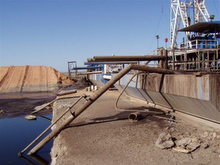
The mission of Drilling
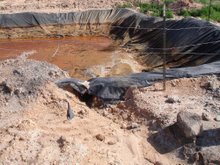

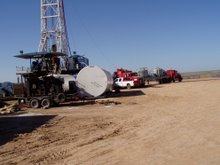
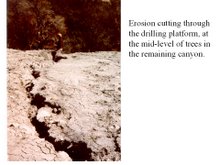
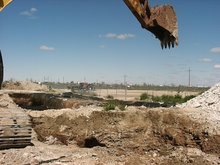

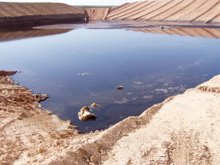
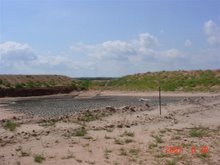
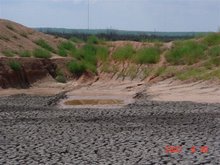
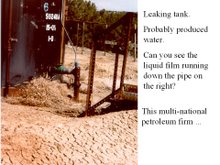
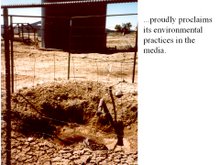
Bob Gallagher of the New Mexico Oil and Gas Association noted that the state's landowner protection law, which just went into effect July 1, was borne out of cooperation between landowners and energy companies. The result was a balanced, fair bill that protected both sides, he said.
"It does not delay or deny access to mineral resources," Gallagher said.
Gallagher implied that the federal legislation, by contrast, is too one-sided. "It is not a good start. It is not a good finish. It was not written by someone in the field doing the work," he said.
Aside from the split-estate provisions, H.R. 2337 would amend sections of the 2005 Energy Policy Act that accelerated oil and gas drilling on public lands, severely limit the Interior Department's royalty-in-kind program and establish a fee on nonproducing leases. The measure also aims to bolster carbon sequestration studies and require new studies for wind power siting, and it would establish an intra-agency panel to address the effect of warming on federal lands, oceans and federal water infrastructure (E&E Daily, July 16).
Gable is an independent energy and environmental writer in Woodland Park, Colo
The House of Representatives will vote next week. Congressman Udall: Phone 202-225-6190 or 505-984-8950
